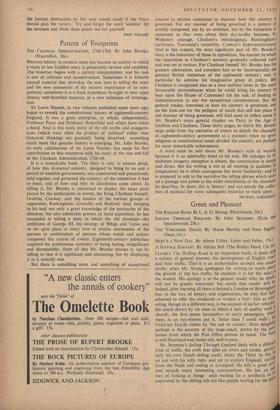Pax Atomica
ATOMIC QUEST. By Arthur H. Comptpn. (O.U.P., 30s.)
PROFESSOR 131-AcKETT, it seems, has emerged from political ignominy with time, credit and yesterday's heterodoxes on his side. hi 1948, from the relative obscurity of Manchester he wrote a book of rude questions about the military and political con- sequences of atomic energy which was regarded as a piece of hot propaganda for the Russians. People at that time were specu- lating fearfully about what would happen when Russia had a stock of atomic weapons of her own. Today, from the relative resplendence of Imperial College, London, he has supplied some of the answers as he sees them. Global war, he says, is most unlikely. Both sides have got the weapons and the means to deliver them, but both sides are so afraid of the other's retaliatory Power that there is an atomic stalemate. In brief, a somewhat uneasy state of pax atomica has been achieved by atomic parity. What now?
According to Blackett, the major military problems are those relating to small-scale colonial wars 'such as are in progress now in various parts of the world' and he feels that the main Concern of the Great Powers must be to prevent such wars from starting and if they do start to prevent them from spreading.
All this and much else besides including reviews of abortive American plans for atomic control, the Oppenheimer affair and an analysis of the sheer cost of living under the threat of enormous destruction has been reduced to a mere hundred pages in a cheap, Concise and carefully written book.
But Professor Blackett still seems to be surprised that politicians and militarists are illogical in their actions; he seems to assume that the long-term policies of those who order these things in the Pentagon, Whitehall and wherever else are governed by syllo- gistic reasoning, and apparently he has not heard about what the animal behaviourists call aggressive display. But this is ignor- ance, bias or faith of a commendable kind. Apart from what to this reviewer seem to be over-positive assertions about the motives of the Americans in dropping the -first atomic_ bombs on Japan, the book is recommended without qualifitation.
An American political analyst called Paul H. Nitze has dis- tinguished between his country's 'action policy' which he holds is (or, as Professor Blackett says, should be) graduated deterrence from her 'declaratory policy' of massive retaliation. The declared Policy of the United States in dropping atomic weapons on Japan was to save lives that might otherwise have been lost in a drawn- out struggle for the last ditch. Professor Blackett and many others assert that the real reason was to keep the Russians out of Japan and, perhaps, to justify the cost of the bomb programme to Con- gress. This is denied, strongly, in a book by one of the famous Compton brothers of America.
Arthur H. Compton is a distinguished radiologist and Nobel prize winner who, with Fermi, Oppenheimer, Lawrence, Vannevar Bush, Conant and the others, was responsible for the production cif The First Bomb. He is apparently a God-fearing physicist; his book is a curious mixture of fact and sentiment written, one feels, for the sake of his conscience and 'the record.' It will be of value chiefly to those who want details about a time of much soul-searching among scientists. This is not as well known as it should be.
Leo Szilard, for instance, was one of those responsible for bringing the concept of the bomb to President Roosevelt but When he knew it was going to be dropped on Japan he protested personally to President Truman and circulated petitions in the laboratories of the bomb-makers.
Contradicting Blackett specifically, Compton says it is wrong to argue that the Japanese, as a nation, were ready to surrender
b Lei ore it was dropped. The Emperor would have surrendered if he could but fanatics would have fought on desperately. Szilard, °n the other hand, was ready to drop an atomic bomb on Germany because he felt it 'would be an evil less than that of the human destruction he felt sure would result if the Nazis should gain the victory.' Try and 'forget the word `scientist' for the moment and think these points out for yourself.
JOHN HILLABY











































































 Previous page
Previous page